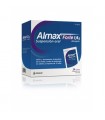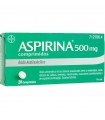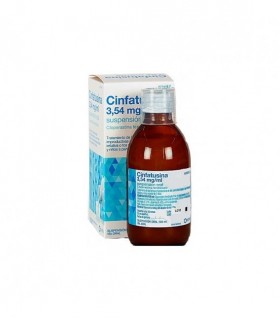This medicine contains aspirin and ascorbic acid (vitamin C) as active substances and works by reducing pain and fever.
It is indicated in symptomatic relief from mild or moderate occasional pains, such as headaches, dental, menstrual, muscle (contractures) or back (lumbalgia). Febrile states.
1. What ASPIRIN C is and what it is used for
This medicine contains acetylsalicylic acid and ascorbic acid (vitamin C) as active ingredients and works by reducing pain and fever.
It is indicated for the symptomatic relief of occasional mild or moderate pain, such as headaches, dental, menstrual, muscular (contractures) or back (low back pain). Febrile states.
2. Before you take ASPIRINA c
Do not take ASPIRIN C if
- you are allergic (hypersensitive) or have had an allergic reaction to acetylsalicylic acid, ascorbic acid or any of the other ingredients of this medicine,
- suffer from stomach or intestinal ulcer or recurrent gastric discomfort
- have had allergic reactions of the asthmatic type (difficulty breathing, choking, bronchospasm and in some cases cough or wheezing when breathing) when taking anti-inflammatories, acetylsalicylic acid, other painkillers, as well as the dye tartrazine,
- have or have had asthma
- have nasal polyps associated with asthma that are caused or increased by acetylsalicylic acid,
- suffer from haemophilia or other blood clotting problems
- you are taking oral anticoagulant medicines,
- suffer from kidney and / or liver diseases (kidney and / or liver failure),
- you suffer from renal lithiasis (kidney stones) accompanied by oxaluria (elimination of calcium oxalate in the urine) or aciduria (acid urine),
- have any of the following diseases related to disorders in red blood cells: glucose-6-phosphate dehydrogenase deficiency, hemochromatosis, sideroblastic anemia and / or thalassemia,
- you are under 16 years of age, as the use of acetylsalicylic acid has been linked to Reye's syndrome, a rare but serious disease,
- you are in the third trimester of pregnancy.
Take special care with ASPIRINA C
You should consult your doctor in case you require this medicine:
- if you have high blood pressure, or have reduced kidney, heart or liver functions, or have blood clotting disorders,
- if you have had a stomach or intestinal ulcer,
- if you are taking anticoagulants,
- if you are taking anti-inflammatories or other types of medicines as certain medicines can interact with Aspirin C and produce undesirable effects (see section “Using other medicines”),
- if you are allergic to other anti-inflammatory or anti-rheumatic drugs,
- if you have a deficiency of glucose-6-phosphate dehydrogenase,
- if you suffer or have suffered from rhinitis or urticaria,
- patients with a history of kidney stone formation or with gout,
- if you have recently undergone or are due to undergo surgery within the next 7 days, including dental surgery,
- not administer systematically to prevent possible discomfort caused by vaccinations,
- If you are diabetic, the ascorbic acid content of this medicine may cause erroneous results in urine glucose tests, including test strip tests.
Use of other medications
Tell your doctor or pharmacist if you are using or have recently used other medicines, including those obtained without a prescription, homeopathic, herbal medicines and other health-related products as it may be necessary to interrupt treatment or adjust the dose of some of them.
This is especially important in the case of:
- other pain relievers or non-steroidal anti-inflammatory drugs, high doses of salicylates (medicines used to treat muscle pain and / or inflammation),
- some antidepressants, such as selective serotonin reuptake inhibitors, as it increases the risk of bleeding,
- anticoagulants (medicines used to 'thin' the blood and prevent clots) such as warfarin,
- hormonal contraceptives,
- oral antidiabetics (medicines to lower blood sugar),
- barbiturates (medicines used to treat seizures),
- beta-blockers (drugs for hypertension control ),
- cimetidine and ranitidine (used for heartburn),
- medicines used to prevent rejection of transplants (cyclosporine and tacrolimus),
- corticosteroids, as they can increase the risk of gastrointestinal bleeding,
- digoxin (heart medicine),
- high blood pressure (diuretics and ACE inhibitors),
- phenytoin and valproic acid (antiepileptics),
- interferon alfa (used to treat certain viral and tumor infections),
- lithium (used in some psychiatric illness),
- cancer or rheumatoid arthritis (methotrexate)
- medicines used to treat gout (probenecid),
- sulfonamides, t- rimethoprim / sulfamethoxazole and vancomycin (antibiotics used for infections),
- zidovudine (used to treat patients infected with the human immunodeficiency virus, which causes AIDS).
Interference with diagnostic tests
If you are going to do a diagnostic test (including blood, urine, etc…), tell your doctor that you are taking this medicine, as it may alter the results.
Taking ASPIRIN C with food and drink
Take this medicine after meals or with food.
If you habitually consume alcohol (three or more alcoholic drinks –beer, wine, liquor,… - a day) taking ASPIRIN C can cause stomach bleeding.
Pregnancy
Consult your doctor or pharmacist before taking any medicine.
This medicine should not be used during pregnancy.
|
IMPORTANT FOR WOMEN: If you are pregnant or think you might be, consult your doctor before taking this medicine. The consumption of this medicine during the first and second trimesters of pregnancy can be dangerous for the embryo or fetus and should be monitored by your doctor. Do not take this medicine during the third trimester of pregnancy as it may prolong labor and contribute to bleeding in the mother or baby. |
Under normal conditions, doses higher than 100 mg per day of vitamin C do not need to be administered in pregnancy and, in any case, always on the doctor's orders. Although there is no evidence of harmful effects, the fetal safety of high doses of vitamin C has not been established.
Lactation
Consult your doctor or pharmacist before taking any medicine.
Breastfeeding women should consult a doctor before taking this medicine, as acetylsalicylic acid and ascorbic acid pass into breast milk.
Use in children:
Do not administer to children under 16 years of age.
Use in over 65s
Elderly people should not take this medicine without consulting their doctor, as they are more prone to its side effects.
Driving and using machines
No effect on the ability to drive or use machines has been reported.
Important information about some of the ingredients of ASPIRIN C
Patients on a low sodium diet should note that this medicine contains 471 mg (20.5 mmol) of sodium per effervescent tablet.
3. How to take ASPIRIN C
Follow these instructions unless your doctor has given you different directions.
Ask your doctor or pharmacist if you have doubts.
This medicine is administered orally.
Adults and over 16 years : 1 effervescent tablet every 6 hours, if necessary.
It will not exceed 4 effervescent tablets in 24 hours.
Patients with reduced liver or kidney functions : consult a doctor as the dose must be reduced.
Fully dissolve the effervescent tablet preferably in half a glass of water and drink the entire contents of the glass when the bubbling has completely stopped.
Take the medicine after meals or with milk, especially if digestive discomfort is noted.
Do not take this medicine on an empty stomach.
Always use the lowest dose that is effective.
The administration of this preparation is subject to the appearance of painful or feverish symptoms. As these disappear, this medication should be discontinued.
If the pain persists for more than 5 days, or the fever for more than 3 days, or the symptoms worsen or other symptoms appear, you should stop the treatment and consult a doctor.
If you take more ASPIRIN C than you should
The main symptoms of overdose are: headache, dizziness, ringing in the ears, blurred vision, drowsiness, sweating, rapid breathing, mental confusion, nausea, vomiting and occasionally diarrhea.
Doses greater than 1 gram per day of vitamin C (5 or more tablets per day) can cause diarrhea, kidney stones and abdominal cramps. There is also the risk of stone formation and of precipitating acute gout attacks in predisposed individuals.
It will be recommended to bring the package and the package leaflet to the healthcare professional.
In case of overdose or accidental ingestion, immediately consult your doctor or pharmacist or go to a medical center immediately or call the Toxicology Information Service, telephone: 91 562 04 20, indicating the medicine and the amount ingested.
4. Possible side effects
Like all medicines, ASPIRIN C can cause side effects, although not everyone gets them.
Common side effects (seen between 1 and 10 in 100 people):
- Gastrointestinal disorders, such as stomach ulcer, intestinal ulcer, gastrointestinal bleeding, abdominal pain, heavy digestion, burning, heartburn, gastric discomfort, nausea and vomiting.
- Respiratory disorders, such as shortness of breath (asthma, bronchial spasm), nasal congestion, and rhinitis.
- Urticaria (raised, reddish bumps that are often itchy and burning), skin rashes, angioedema (swelling and swelling affecting the face, lips, mouth, tongue or throat, which may cause difficulty swallowing or breathing), and itching.
- Hypoprothrombinemia (impaired coagulation) when given in high doses.
Uncommon side effects (seen in between 1 and 100 in 1,000 people):
- Reye's syndrome in children under 16 years of age with febrile processes, flu or chickenpox (see "Before taking ASPIRIN C ").
- Liver disorders, especially in patients with juvenile arthritis.
- Anemia
- Occasionally, and at doses higher than 600 mg / day of vitamin C (3 tablets / day): diarrhea, reddening of the skin, headache, nausea, vomiting and stomach cramps.
- There is a risk of stone formation in the urinary tract or gout attacks in predisposed individuals.
With prolonged doses of acetylsalicylic acid, the following side effects have been observed, the frequency of which has not been accurately established: dizziness, noise in the ears, deafness, sweating, headache, confusion, kidney failure and acute interstitial nephritis (inflammation to kidney level).
If you notice the appearance of:
- Stomach upset or pain, gastric or intestinal bleeding, or black stools.
- Skin disorders, such as rashes or redness.
- Difficulty breathing.
- Unforeseen change in the amount or appearance of urine.
- Swelling of the face, feet, or legs.
- Deafness, ringing in the ears, or dizziness.
stop taking the medicine and consult your doctor immediately, as they may indicate the appearance of side effects that need urgent medical attention.
Communication of adverse effects:
If you experience any kind of side effect, talk to your doctor, pharmacist or nurse, even if it is about possible side effects that are not listed in this leaflet. You can also communicate them directly through the Spanish Pharmacovigilance System for medicines for Human Use: https://www.notificaram.es . By reporting side effects you can help provide more information on the safety of this medicine.
5. How to store ASPIRIN C
Keep out of the reach and sight of children.
Do not store above 25ºC .
Expiration
Do not use ASPIRIN C after the expiry date which is stated on the carton, after the abbreviation EXP. The expiration date is the last day of the month indicated.
Medicines must not be disposed of via wastewater or household waste. Deposit the containers and medicines you do not need at the Sigre Point of the pharmacy. If in doubt, ask your pharmacist how to dispose of medicines no longer required. This way you will help to protect the environment.
6. Additional information
Composition of ASPIRINA C
Each effervescent tablet contains:
- As active principles: acetylsalicylic acid, 400 mg and ascorbic acid (vitamin C), 240 mg.
- The other ingredients (excipients) are: sodium hydrogen carbonate, anhydrous sodium carbonate, saccharin, sodium citrate, anhydrous citric acid, orange tetraroma aroma, orange aroma, lemon aroma and raspberry aroma.
What the product looks like and contents of the pack
This medicine is white, round effervescent tablets. It comes in packs containing 10 and 20 effervescent tablets.
Marketing authorization holder Responsible for manufacturing
Bayer Hispania, SL Bayer Bitterfeld GmbH
Av. Baix Llobregat, 3-5 OT Greppin
08970 Sant Joan Despí (Barcelona) Salegaster Chausee, 1
06803- Bitterfeld-Wolfen ( Germany)
This leaflet was revised in February 2016
Detailed and updated information on this medicine is available on the website of the Spanish Agency for Medicines and Health Products (AEMPS) http://www.aemps.gob.es





























